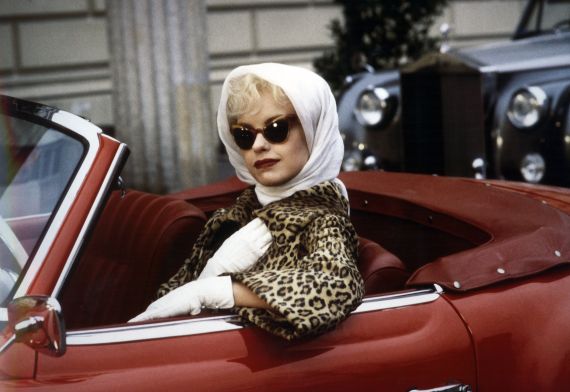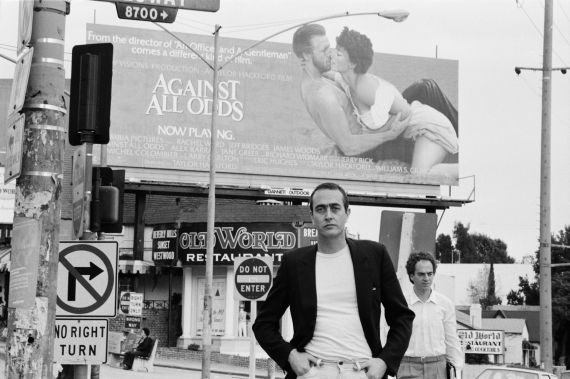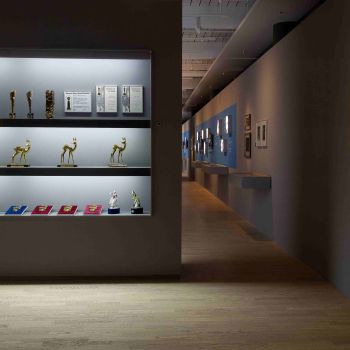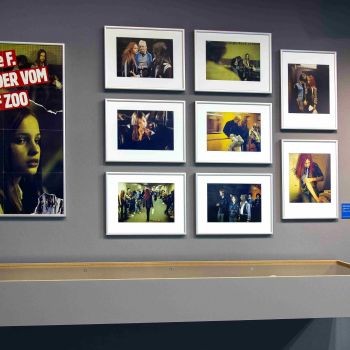
Photo/©: Karin Rocholl
Bernd Eichinger – ... alles Kino (... Everything is Cinema)
28.6. – 6.10.13
Exhibition
Bernd Eichinger (1949–2011) was Germany’s most important film producer in recent decades. Fulfilling diverse functions, he oversaw and accepted responsibility for more than 100 film and television productions. His name is linked to the Munich distribution company “Constantin Film” where he took an active role until 2006. Initially under the name “Neue Constantin,” he led the company to major successes, building one upon the other since the 1980s.
What does a film producer do? He bears financial responsibility for a film project from beginning to end: from the development of its subject through its international marketing. He is the “driving force” behind every film production, and must know all its steps and consider any risks involved. The film producer Bernd Eichinger, who studied at the University of Television and Film Munich (HFF), embodied this role as a creative authority with all his passion; like no other. Eichinger made films for a “wide audience” beginning with his involvement with “Constantin”, although his productions often raised controversy among German critics. Within the international film business Eichinger enjoyed great recognition.
Acquired by the Deutsche Kinemathek in 2012, the “Bernd Eichinger Collection” was being presented to the public in this exhibition for the first time. It approached Eichinger’s biography and his work from various perspectives: A chronological table combined important events from his professional, private and public lives with objects, photographs and film clips. The sections of the exhibition entitled “Heroes,” “Germany,” “America” and “Outsiders” were concerned with themes in Bernd Eichinger’s life, which were reflected in his films and projects. A media installation at the end of the exhibition made up of three large-scale, choreographed projections offered insights into Bernd Eichinger’s thought processes and his rare creative potential.
Key aspects
Heroes
Bernd Eichinger's autograph
Photo/©: Jürgen Olczyk
Source: Deutsche Kinemathek – Sammlung Bernd Eichinger
Cinema often tells of heroes. They overcome their fears and weaknesses, and fight for good. They act as examples with whom audiences can identify. Eichinger was driven by the question about “what someone is made of,” both privately and as a filmmaker. His favorite heroes were Winnetou and Prinz Eisenherz (Prince Valiant), and in times of personal crisis he relied on his books by Karl May and Hal Foster’s comic strip narratives. Another heroic myth that continued to engage him during his lifetime is the Nibelung saga. Bernd Eichinger, who had to fight with a number of his own fears, including a fear of heights, always considered filmmaking to be a “race to the top” and consequently a show of willpower. “No Fear!” – he once noted on a napkin, either as a motto or in self-reproach.
The first major heroic tale that Eichinger brought to the screen was The Neverending Story (directed by Wolfgang Petersen, FRG/USA 1984). The use of state-of-the-art technology made this screen adaptation of Michael Ende’s novel into one of the most expensive German productions of its time. It tells the story of the boy Bastian Bux, who while reading is drawn into a magical book where he attempts to save a world called Fantastica, together with its Childlike Empress and other friends. Stories about heroes often deal with growing up and learning to take on responsibility. This applies to the monk Adso in The Name of the Rose (directed by Jean-Jacques Annaud, FRG/FR/IT 1986) as well as to the young scientists in The Fantastic Four (directed by Tim Story, USA/DE 2005). Eichinger had already acquired the film rights to this Marvel comic strip series by the mid-1980s, but hardly anyone was interested in superheroes back then. Eichinger secured the material for himself in 1994 with a film adaptation (The Fantastic Four, directed by Oley Sassone), which he produced together with Roger Corman, but never released it to movie theaters. It was not until after 2000 that the time had come for an internationally successful large-scale production, to be followed by a sequel.
Germany

Nina Hoss in Das Mädchen Rosemarie (G 1996, directed by Bernd Eichinger)
Source: Deutsche Kinemathek – Sammlung Bernd Eichinger
Over the course of his career, Bernd Eichinger sovereignly moved in very different environments within German film. Through his activities as a producer for Solaris Film- und Fernsehproduktion, which he co-founded, Eichinger had forged well-established networks with auteur filmmakers, including Alexander Kluge, Edgar Reitz, Hans Jürgen Syberberg and Wim Wenders since the 1970s. Conversely, he vehemently supported the commercially successful German comedy boom of the 1990s with films such as Werner – Beinhart! (directed by Niki List, Michael Schaack, Gerhard Hahn, DE 1990), The Most Desired Man (directed by Sönke Wortmann, DE 1994) and Ballermann 6 (directed by Gernot Roll, Tom Gerhardt, DE 1997). The art and cultural scene in Munich’s Schwabing district – which Helmut Dietl highly ironically portrayed in the film Rossini (DE 1997) – was a biographical constant in his professional and private life that served him as a place of retreat and as a professional platform.
In 1996, Eichinger produced the so-called “German Classics” – remakes of German movies from the 1950s – for the TV station Sat.1. For the new version of Rolf Thiele’s The Girl Rosemarie, from 1958, he wrote the film script and directed for the first time in 20 years. Downfall (directed by Oliver Hirschbiegel, DE/IT/RU/AT 2004), inspired by a book by Joachim C. Fest about Hitler’s last days in the “Führerbunker” and the recollections of Hitler’s secretary Traudl Junge, is among his most controversial productions. Bernd Eichinger wrote the film script and sought the support of leading German print media – Bild, Der Spiegel and the Frankfurter Allgemeine Zeitung – for the film’s release. More than 4.5 million viewers saw the film in Germany. The producer reemerged as a screenwriter through The Baader Meinhof Complex (directed by Uli Edel, DE 2008), motivated by Stefan Aust’s nonfiction book of the same name. Like Downfall, this film was not awarded in any category of the Deutscher Filmpreis (German Film Awards), which has been presented by the Deutsche Filmakademie (German Film Academy) since 2005, an initiative for which Eichinger was largely responsible. However, both films were nominated for an Oscar.
USA

Bernd Eichinger, Los Angeles 1980s
Photo/©: Karin Rocholl
Source: Deutsche Kinemathek – Sammlung Bernd Eichinger
Bernd Eichinger’s great-grandfather had emigrated to the USA and ran a brewery in Brooklyn, New York. The family returned to Bavaria around 1900. Three generations later, the young Bernd Eichinger also aspired to create ties to America.. Throughout his life he was enthusiastic about the books of Karl May and American comics. As the boss of Neue Constantin Film, Eichinger increased the distribution business with American feature films, which he would release in Germany through a large number of copies. He established active relations to Hollywood and secured his place in the international film business with his productions The Neverending Story (directed by Wolfgang Petersen, FRG/USA 1984) and The Name of the Rose (directed by Jean-Jacques Annaud, FRG/FR/IT 1986), both adaptations of successful books.
In Last Exit to Brooklyn (directed by Uli Edel, FRG/USA 1989), based on the scandalous autobiographical novel by Hubert Selby, Eichinger realized a German-American coproduction “on location” in what at that time was still a largely disreputable New York borough. A year later he moved to Los Angeles, where he operated an office; thereafter shuttling back and forth between the continents. His international coproduction The House of Spirits (directed by Bille August, DE/DK/PT/USA1993) was created with American participation. This film adaptation, of a novel by Isabel Allende with the same title, cast the international stars Meryl Streep, Glenn Close, Jeremy Irons, Winona Ryder and Antonio Banderas in the leading roles.
Bernd Eichinger was a member of the Academy of Motion Picture Arts and Sciences. Winning an Academy Award would certainly have made a life-long ambition come true for him. In the end, Nowhere in Africa (directed by Caroline Link, DE 2001), a movie that he coproduced, became the first German feature film to receive an Oscar (2003) in more than 20 years. In 2002, Eichinger achieved great commercial success in the USA with the screen adaptation of the computer game Resident Evil (directed by Paul W. S. Anderson).
Bernd Eichinger died in Los Angeles on January 24, 2011.
Outsiders

Christiane F. – Wir Kinder vom Bahnhof Zoo (FRG 1981, directed by Uli Edel)
Source: Deutsche Kinemathek
Throughout his life, Bernd Eichinger always felt attracted to outsiders. As a film producer, he saw potential for wide audiences to identify with their life stories. His first major success, Christiane F. (directed by Uli Edel, FRG 1981), tells of drug addiction and child prostitution in Berlin. The film, shot at original locations without a film permit, shocked the public through its authenticity and simultaneously struck a generation’s attitudes towards life. Eichinger’s enthusiasm for Hubert Selby’s dark novel Last Exit to Brooklyn attests to his interest in society’s outsiders, such as prostitutes or transvestites. Other of his literary screen adaptations, for instance The Cement Garden (directed by Andrew Birkin, GB/DE/FR 1993), a drama about incest, or Perfume – The Story of a Murderer (directed by Tom Tykwer, DE/FR/ES/USA 2006), based on Patrick Süskind’s bestseller, also tell stories outside of social norms. Eichinger made efforts to get the rights to Süskind’s subject matter for 15 years, because he was convinced of its cinematic potential.
Influenced by his own adolescence at a Catholic boarding school, Eichinger treated two biographies of women with special commitment: the first concerning Rosemarie Nitribitt and the second on Natascha Kampusch. Eichinger directed the TV production of The Girl Rosemarie (DE 1996) about the prostitute Nitribitt, who grew up in a home for juvenile delinquents and whose death in 1957 triggered a scandal. Eichinger worked on the film script about Natascha Kampusch’s history of suffering – she was kidnapped at age 10 and held prisoner by a man for more than eight years – until shortly before his death.
Gallery
-

The exhibition
Photo/©: Marian Stefanowski -

The exhibition
Photo/©: Marian Stefanowski -

The exhibition
Photo/©: Marian Stefanowski -

The exhibition
Photo/©: Marian Stefanowski -

Behind the scenes of The NeverEnding Story (FRG/USA 1984, directed by Wolfgang Petersen)
Source: Deutsche Kinemathek – Sammlung Bernd Eichinger -

Jan Josef Liefers & Bernd Eichinger behind the scenes of Der Baader Meinhof Komplex (G 2008, directed by Uli Edel)
Photo: Jürgen Olczyk
Source: Deutsche Kinemathek – Sammlung Bernd Eichinger -

Uli Edel, Jennifer Jason Leigh, Bernd Eichinger: Premiere of Last Exit to Brooklyn (FRG/USA 1989, directed by Uli Edel)
Photo: Jürgen Olczyk
Source: Deutsche Kinemathek – Sammlung Bernd Eichinger
Information and Credits
Credits
Artistic Director: Dr. Rainer Rother
Curators: Peter Mänz, Kristina Jaspers
Project management: Peter Mänz
Exhibition coordination: Vera Thomas
Media installation: Gerlinde Waz
Audiovisual media program: Nils Warnecke, Gerlinde Waz
Archivist in charge of the Bernd Eichinger Collection: Gerrit Thies
Archiving of the Bernd Eichinger Collection: Peter Jammerthal, Anke Vetter
Exhibition assistance: Georg Simbeni
Editing: Rolf Aurich
Editing of the website: Karin Herbst-Meßlinger
English translations: Wendy Wallis, Transart, Berlin
Design of the advertising graphics: Pentagram Design, Berlin
Design of the exhibition graphics: Jan Drehmel, Befreite Module, Berlin
Production of the exhibition graphics: Bartneck Print Artists, Berlin, and PPS Imaging GmbH, Berlin
Exhibition design: Camillo Kuschel Ausstellungsdesign, Berlin
Costume restoration: Barbara Schröter
Costume installation: Theaterkunst GmbH Kostümausstattung, Berlin
Conservational supervision: Sabina Fernández, Berlin
Editing of the audiovisual media: Anette Fleming, Concept AV, Berlin
Editing of the audiovisual media (chronology): Volkmar Ernst
Media and lighting installations: Stephan Werner
Technical services: Frank Köppke, Roberti Siefert
Marketing: Sandra Hollmann
Press: Heidi Berit Zapke
Museum education and mediacy: Jurek Sehrt
Program Gallery: Holger Theuerkauf
Interns: Friedrich Thorwald, Anne Ziegenbruch
Finance: Uwe Meder-Seidel
Audio guide: Linon Medien, Berlin
Video Installation “No Fear!”
Written and directed by: Gerlinde Waz
Film editing: Anette Fleming, Concept AV, Berlin
Narrator: Lutz Riedel
Sound mixing and voiceovers: Jochen Voerste
Fotos Exponate: Marian Stefanowski
Film editing assistance (graphics): Ruth Tromboukis
Color Matching: Stefan Engelkamp
Lenders
Constantin Film AG, München
Deutsche Kinemathek – Fotoarchiv
Deutsche Kinemathek – Grafikarchiv
Deutsche Kinemathek – Kostümarchiv
Deutsche Kinemathek – Sammlung Bernd Eichinger
Deutsche Kinemathek – Sammlung Rolf Giesen
Deutsche Kinemathek – Sammlung Uli Hanisch
Deutsche Kinemathek – Sammlung Theaterkunst
Katja Eichinger, München
Nina Eichinger, München
Katja Flint, Berlin
Yasmina Majid, München
Jürgen Olczyk, München
Waldemar Pokromski, Berlin/Warschau
Karin Rocholl, Hamburg
Rainer Stock, Essen
Hans Jürgen Syberberg, München und Nossendorf
Theaterkunst GmbH Kostümausstattung
Herman Weigel, München
Lenders (Media)
ARD
Bayerischer Rundfunk, München
David Dietl, München
dctp Entwicklungsgesellschaft für TV-Programm mbH, Düsseldorf
Diana Film GmbH, München
Fettfilm, Leipzig
Filmgalerie 451, Berlin
Global Screen GmbH, München
Hochschule für Fernsehen und Film München
Radio Bremen, Bremen
Rundfunk Berlin-Brandenburg, Berlin
Solaris Film GmbH & Co. Produktions KG, München
Südwestrundfunk, Stuttgart
Zweites Deutsches Fernsehen, Mainz
Acknowledgements
Our special thanks go to Katja Eichinger and Nina Eichinger
Sabine Ambros, München
Husam Chadat, München
Marianne Dennler, München
Corinna Dobrott, Berlin
Sabine Eichinger, München
Katja Flint, Berlin
Susanne Franke, Hamburg/Berlin
Tanja Goll, München
Nina Goslar, Mainz
Uli Hanisch, Köln/Berlin
Momme Hinrichsen, Leipzig
Robert Jarmatz, Berlin
Susan Joergensen, München
German Kral, München
Yasmina Majid, München
Torge Møller, Leipzig
Martin Moszkowicz, München
Thomas Müller, Stuttgart
Jürgen Olczyk, München
Waldemar Pokromski, Berlin/Warschau
Josef Reidinger, München
Christine Rothe, München
Stephan Rothmund, Stuttgart
Frieder Schlaich, Berlin
Nicole Schmidt, Mainz
Sandra Schmidt, München
Isabel Siben, München
Hans Jürgen Syberberg, München und Nossendorf
Tom Tykwer, Berlin
Christina Voigt, Frankfurt/Main
Julia Weber, München
Herman Weigel, München
Gabriele Wenger-Glemser, München
Hans Weth, München
and all of our colleagues at the Deutsche Kinemathek – Museum für Film und Fernsehen.
Partner
Kindly supported by
Versicherungskammer Bayer. Sparkassen Finanzgruppe
Produzentenallianz
Constantin Film
Theaterkunst Kostümausstattung
barefoot films
ARD
ZDF
Media Partners
Inforadio rbb
tip Berlin
Yorck Kinogruppe
Mobility Partner
Deutsche Bahn
The Deutsche Kinemathek is sponsored by
Die Beauftragte der Bundesregierung für Kultur und Medien
in accordance with a decision of the German Bundestag